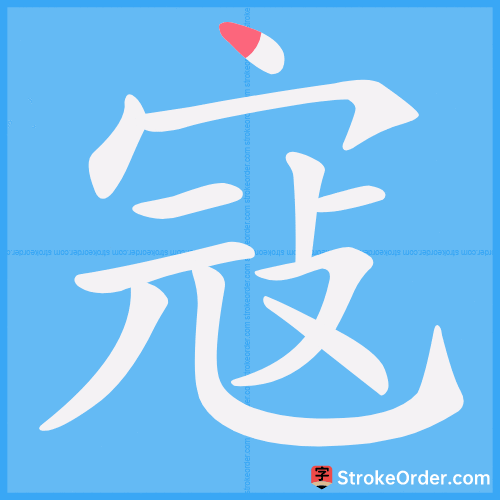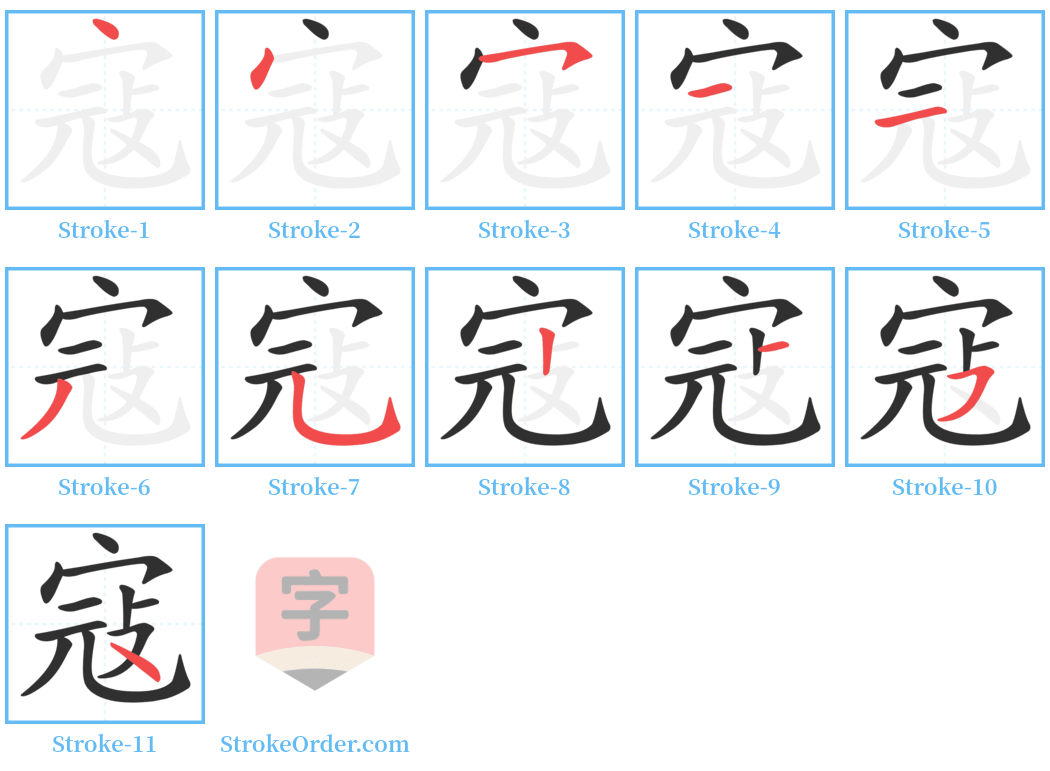寇 Stroke Order
Animated Stroke Order of 寇

Stroke Order Diagrams for 寇

Step-by-Step Handwriting Guide for 寇

Learn to Write Chinese Characters with Video Tutorials
Watch the video of writing the Chinese character "寇", learn the correct stroke order (笔顺) of the character "寇", and master the standard way of writing the character "寇".
Free Printable Handwriting Practice with Stroke Order: 寇
Printable Writing Practice Worksheet of "寇" in Portrait Orientation (Tian Zi Ge)

Printable Writing Practice Worksheet of "寇" in Landscape Orientation (Tian Zi Ge)

Information of 寇
Pinyin
kòu
Radical
宀
Strokes
11 strokes
Usage
★★★★★
Definition
bandit
寇 [kòu]
1. 腰匪,侵略者,亦指敌人。
Bandit, invader; also refers to an enemy.
2. 侵略者来侵犯。
Invader comes to invade.
3. 姓。
A surname.
---
寇 [kòu] (verb)
- 本义: 入侵; 侵犯
Original meaning: invade; infringe
- 造字法: 会意。从宀( mián),表示与室家房屋有关,从元(人),从攴( pū),表示持械击打。意思是手持器械的人,侵犯到房子里来打人。
Word formation: Ideographic. It is composed of the semantic component 宀 (mián), indicating a relationship with houses, and the components 元 (person) and 攴 (pū), indicating one who wields a weapon. The meaning is that a person holding a weapon invades a house to attack.
1. 同本义 ([En.] invade; plunder)
Same original meaning: to invade; to plunder.
引:
1. 《说文》:寇,暴也。与败贼同义(朋侵)。
"Shuōwén": "Kòu" means violence, synonymous with 'defeated bandit'.
2. 《书·舜典》:寇贼奸宄。传: “群行攻劫曰寇。”郑注: “强取为寇。”
"Book of Documents": Bandits and thieves. The commentary indicates that collectively attacking and robbing is called "kòu".
3. 《左传·文公七年》:凡兵作于内为乱,于外为寇。
"Zuo Zhuan": Any soldiers causing chaos inside are 'rebels', while those from outside are 'invaders'.
4. 《吕氏春秋·贵公》:大兵不寇。
"Lüshi Chunqiu": Large armies do not invade.
5. 《盐铁论·本议》:匈奴背叛不臣,数为寇暴于边鄙。
"Discourses on Salt and Iron": The Xiongnu rebelled against their sovereign and repeatedly acted as invaders on the borders.
6. 《资治通鉴》:吐蕃发十万兵寇西川。
"Zizhi Tongjian": The Tubo sent 100,000 troops to invade Xichuan.
例:
如: 寇戎(来犯的敌军); 寇虐(侵掠残害之行)寇钞(攻劫掠夺); 寇剽(抢劫); 寇钞(亦作“寇抄”。劫掠); 寇攘(劫掠; 侵扰); 寇窃(抢劫; 盗窃)
For example: Kòu-róng (invading enemy forces); Kòu-nüè (acts of pillaging and harming); Kòu-chāo (robbery and plunder); Kòu-piāo (to loot); Kòu-jiā (to rob); Kòu-qiè (to steal; to rob).
---
寇 [kòu] (noun)
1. 入侵者 ([En.] invader)
Invader.
引:
1. 杜甫《登楼》:西山寇盗莫相侵。
Du Fu: "Do not let the bandits of the western mountains invade."
2. 敌人 ([En.] enemy)
Enemy.
引:
1. 《资治通鉴》:岂可复留此残寇,使长为国家之忧者。
Zizhi Tongjian: "How can we leave these remaining enemies to be a long-term concern for the nation?"
3. 贼兵,敌军 ([En.] foe)
Foe.
引:
1. 《墨子·公输》:在宋城上而待楚寇矣。
Mozi: "Wait for the Chu bandits while at Song city."
4. 盗匪 ([En.] bandit)
Bandit.
引:
1. 宋·文天祥《指南录后序》:北与寇往来其间。
"Guide Book Postscript": "The north often interacts with bandits."
例:
如: 寇逆(贼寇,叛逆); 寇劫(指行劫的群盗); 寇戎(匪患与战争); 寇奸(寇贼奸宄)
For example: Kòu-nì (bandits and rebels); Kòu-jié (groups of robbers); Kòu-róng (banditry and warfare); Kòu-jiān (banditry and treachery).
5. 姓
A surname.
Input Method for 寇
Pinyin
kou4
Wubi
pfqc
Cangjie
jmue
Zhengma
wdix
Four Corner
30214
Unicode
U+5bc7